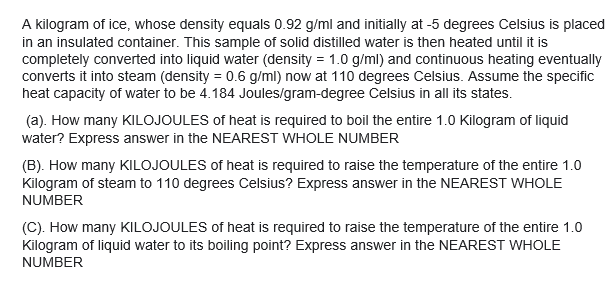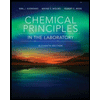A kilogram of ice, whose density equals 0.92 g/ml and initially at -5 degrees Celsius is placed in an insulated container. This sample of solid distilled water is then heated until it is completely converted into liquid water (density = 1.0 g/ml) and continuous heating eventually converts it into steam (density = 0.6 g/ml) now at 110 degrees Celsius. Assume the specific heat capacity of water to be 4.184 Joules/gram-degree Celsius in all its states. (a). How many KILOJOULES of heat is required to boil the entire 1.0 Kilogram of liquid water? Express answer in the NEAREST WHOLE NUMBER (B). How many KILOJOULES of heat is required to raise the temperature of the entire 1.0 Kilogram of steam to 110 degrees Celsius? Express answer in the NEAREST WHOLE NUMBER (C). How many KILOJOULES of heat is required to raise the temperature of the entire 1.0 Kilogram of liquid water to its boiling point? Express answer in the NEAREST WHOLE NUMBER
Thermochemistry
Thermochemistry can be considered as a branch of thermodynamics that deals with the connections between warmth, work, and various types of energy, formed because of different synthetic and actual cycles. Thermochemistry describes the energy changes that occur as a result of reactions or chemical changes in a substance.
Exergonic Reaction
The term exergonic is derived from the Greek word in which ‘ergon’ means work and exergonic means ‘work outside’. Exergonic reactions releases work energy. Exergonic reactions are different from exothermic reactions, the one that releases only heat energy during the course of the reaction. So, exothermic reaction is one type of exergonic reaction. Exergonic reaction releases work energy in different forms like heat, light or sound. For example, a glow stick releases light making that an exergonic reaction and not an exothermic reaction since no heat is released. Even endothermic reactions at very high temperature are exergonic.

Trending now
This is a popular solution!
Step by step
Solved in 2 steps






